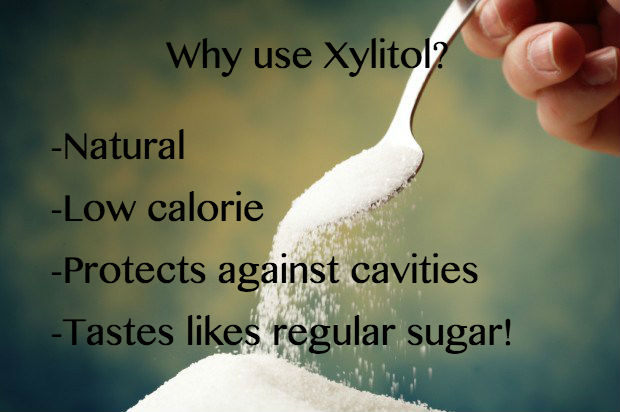What’s Xylitol ?
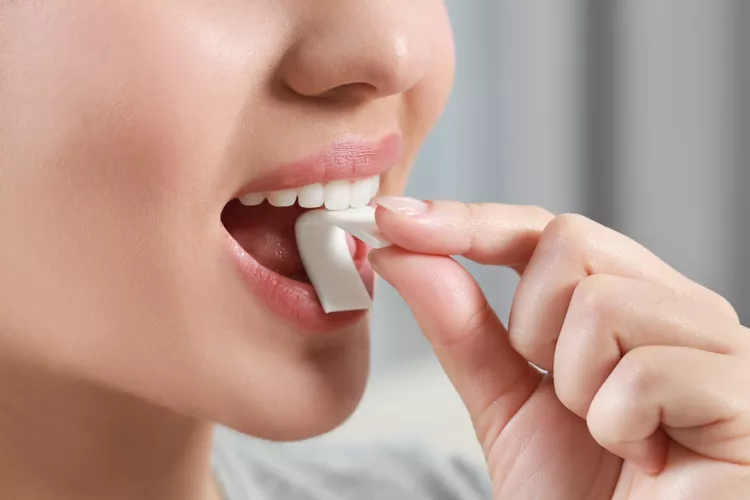
It is categorized as a sugar alcohol.
Chemically, sugar alcohols combine traits of sugar molecules and alcohol molecules. Their structure allows them to stimulate the taste receptors for sweetness on your tongue.
It is found in small amounts in many fruits and vegetables and is therefore considered natural. Humans even produce small quantities of it via normal metabolism.
It is a common ingredient in sugar-free chewing gums, candies, mints, diabetes-friendly foods and oral-care products.
It has a similar sweetness as regular sugar but contains 40% fewer calories:
- Table sugar: 4 calories per gram
- Xylitol: 2.4 calories per gram
Store-bought xylitol appears as a white, crystalline powder.
Since it is a refined sweetener, it doesn’t contain any vitamins, minerals or protein. In that sense, it provides only empty calories.
It can be processed from trees like birch or from a plant fiber called xylan.
Even though sugar alcohols are technically carbohydrates, most of them do not raise blood sugar levels and thereby don’t count as net carbs, making them popular sweeteners in low-carb products.
Though the word “alcohol” is part of its name, it’s not the same alcohol that makes you drunk. Sugar alcohols are safe for people with alcohol addictions.
It is a sugar alcohol that looks and tastes like sugar but has fewer calories and doesn’t raise blood sugar levels. It may have health benefits but could cause digestive issues and other side effects.
Added sugar may be the single most unhealthy ingredient in the modern diet.
For this reason, sugar-free sweeteners like Xylitol are becoming popular.
Several studies suggest that it has various important benefits, including improved dental health.
Health Benefits of Xylitol
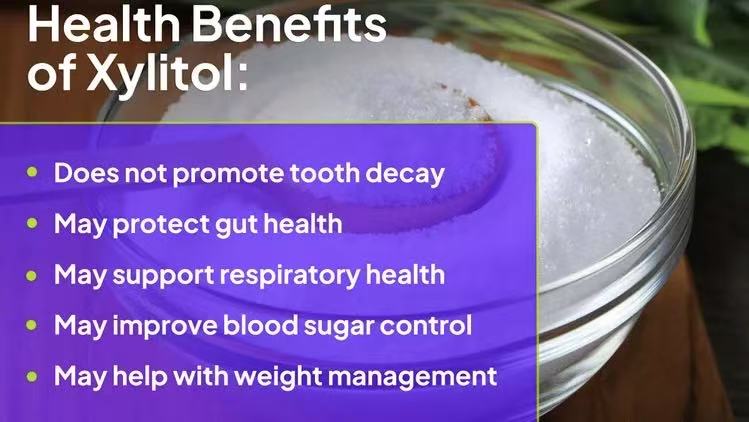
Does Not Promote Tooth Decay
It is best known for protecting against dental caries (cavities). Numerous studies have shown its effectiveness in cavity prevention. Besides sugar-free candies and desserts, it can also be found in gums, mouthwashes, and toothpastes.
One research review found that a fluoride toothpaste with 10% xylitol may reduce cavities by up to 13% compared to a fluoride-only toothpaste.
Though it is similar in sweetness to sugar, it does not have the same corrosive effects sugar has on the teeth. It has been shown to stimulate salivation, which helps remove food deposits from the teeth. It may also prevent cavities by reducing the bacteria Streptococcus mutans, a known promoter of tooth decay, as well as neutralizing some of the acidity in your mouth.
May Protect Gut Health
It may act as a prebiotic—a substance that promotes gut health by feeding beneficial bacteria in the gut. The body doesn’t fully digest xylitol, so much of the sugar alcohol remains solid in the colon, where it feeds good bacteria, keeping the gut microbiome healthy and thriving.
In certain doses, it may also have a laxative effect, which can help relieve constipation. It may also help produce short-chain fatty acids (SCFAs) in the gut, which provide energy and support for your immune system and reduce your risk for colon cancer.
May Support Respiratory Health
It supports immune function by contributing to SCFA production. It also exerts antimicrobial activity, which helps stave off infection. These benefits combined might help reduce respiratory tract infections, such as sinusitis. Though research is limited, it may also be useful for nasal irrigations.
In a study of 52 post-operative sinus surgery patients, half used xylitol solutions for nasal irrigations, while the other half used saline solutions. The xylitol group showed a significant improvement in pain relief and nasal symptom reduction compared to the group using the saline. The study suggests that xylitol may be useful after sinus surgery without causing side effects.
As such, they may be especially beneficial as sugar replacements for people with diabetes. It has been shown to be a safe and effective sugar alternative. However, it’s best tolerated when consumed in moderation.
May Improve Blood Sugar Control
Sugar alcohols are known to have little to no impact on your blood sugars. As such, they may be especially beneficial as sugar replacements for people with diabetes. It has been shown to be a safe and effective sugar alternative. However, it’s best tolerated when consumed in moderation.
Replacing added sugars with lower-calorie it may help reduce belly fat, a leading cause of insulin resistance. Insulin resistance leads to the progression of type 2 diabetes. Insulin is necessary to move glucose (blood sugar) from the bloodstream into our cells for energy, making it an important factor in blood sugar control.
Also, it might have a more direct impact on fat reduction. Animal studies suggest that it may help boost fat-burning in the liver and promote the breakdown and regulation of fat tissue. This suggests a potential to burn more fat rather than store it. However, human trials are necessary to evaluate xylitol’s direct effects on lipid metabolism.
May Help With Weight Management
It has a similar sweetness to sugar but without the calories. Replacing sugar with xylitol can help you reduce your overall calorie intake. While sugar is 16 calories per teaspoon (4 calories per gram), xylitol is significantly lower in calories at just 2.4 calories per gram.
It may also affect appetite control. In a study of 10 people with obesity and 10 people without obesity, participants who received xylitol administered through tube feedings (50 grams in 300 milliliters of water) saw increased levels of satiety hormones, specifically cholecystokinin (CCK) and glucagon-like peptide-1 (GLP-1). Theoretically, xylitol may help reduce appetite.
In another study, combining 12.5 g of xylitol with 12.5 g of polydextrose increased perceived satiety in 16 people without obesity.
May Benefit Your Skin
Applying xylitol to your skin could keep your skin softer and more hydrated. Topical application of xylitol might help seal your skin’s outer layer to prevent moisture losses. When consumed, it might help increase the skin’s integrity. Though these findings are limited to animal studies, you may find xylitol is an ingredient in some moisturizers and sunscreens.
Other research suggests it may have antibacterial properties, which may reduce inflammatory skin issues such as acne. However, small amounts, like those typically consumed in a diet, may not have significant effects.
More research is necessary to determine how effective xylitol may be in protecting your skin.
Risks of Xylitol
It is generally recognized as safe (GRAS) and is an approved food additive in the U.S. It is generally well-tolerated when consumed in the amounts typically found in food. However, it’s best to avoid xylitol during pregnancy or while breastfeeding due to a lack of research.
Possible side effects may include bloating, cramps, constipation, gas, and diarrhea. Symptoms and severity depend on the individual and factors such as the state of fasting, the amount of xylitol, and how it was consumed. However, gastrointestinal (GI) issues typically occur after consuming excessive dosages (>20 g) of xylitol.
According to the U.S. Food and Drug Administration (FDA), it is considered toxic to dogs. When dogs eat xylitol, it is rapidly absorbed into their bloodstream. This can result in hypoglycemia (dangerously low blood sugar). It does not affect humans, nor does it appear to affect cats in this way.
Foods and Products Containing Xylitol
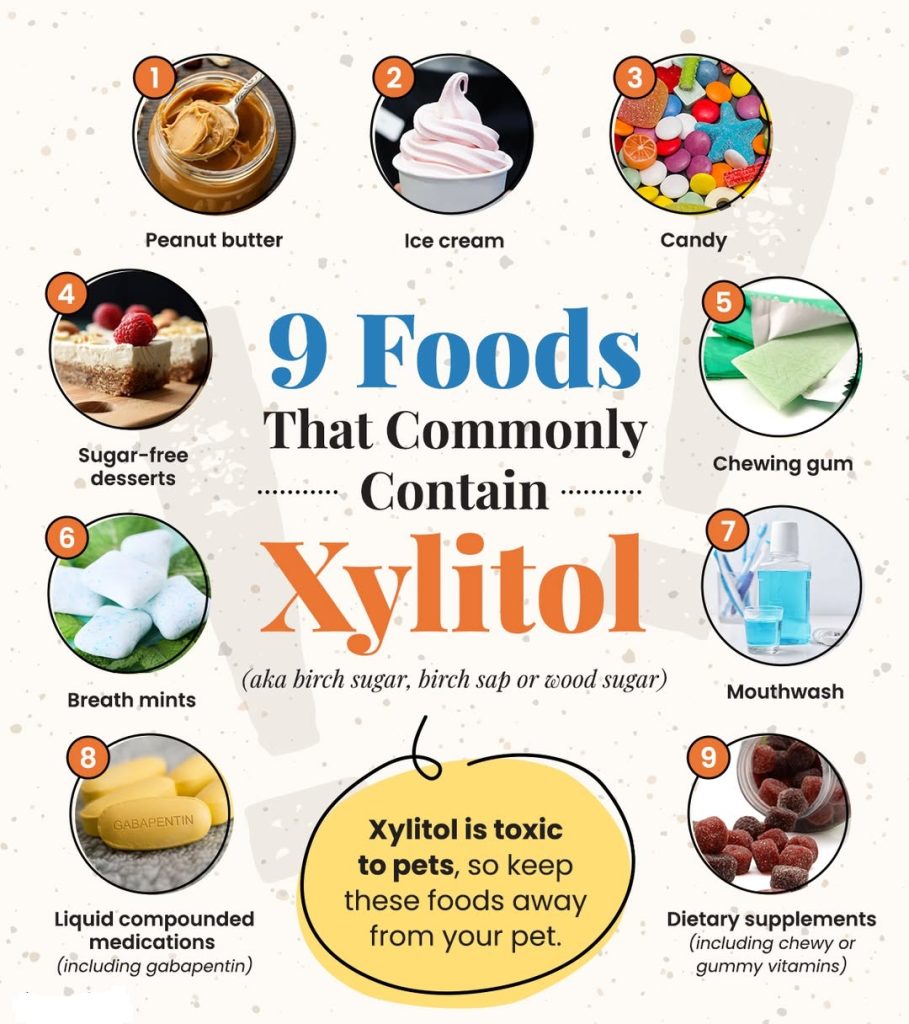
You may find it in various foods, supplements, over-the-counter (OTC) drugs, and oral health products like toothpaste. Here is a list of products that contain xylitol:
- Chewing gum, breath mints, and lozenges
- Mouthwashes and toothpastes
- Baked goods
- Cough syrups
- OTC medicines
- Children’s and adult chewable vitamins
- Certain nut butters
- Dietary supplements
- Sugar-free desserts, including ice creams
Xylitol As a Supplement
It can be used as a supplement to prevent ear infections and may be taken in the form of lozenges, gummies, or syrups. Additionally, xylitol-containing nasal solutions might help with stuffy nose or sinus-related issues. Gums, toothpastes, or mouthwashes that contain xylitol may help prevent tooth decay.
Healthy adults can typically tolerate 10-30 grams (g) of xylitol daily without experiencing diarrhea, although individual tolerance may vary. Some adults may gradually increase their intake to over 200 g daily without side effects. Most adults, however, can manage 20-70 g of xylitol daily.
For children, it is also generally safe. Studies show that infants as young as six months may tolerate 5 g of xylitol three times daily, totaling 15 g daily. Similarly, this amount appears to be safe and well-tolerated in children up to 12 years old.
The main brand of Xylitol Supplement in the market
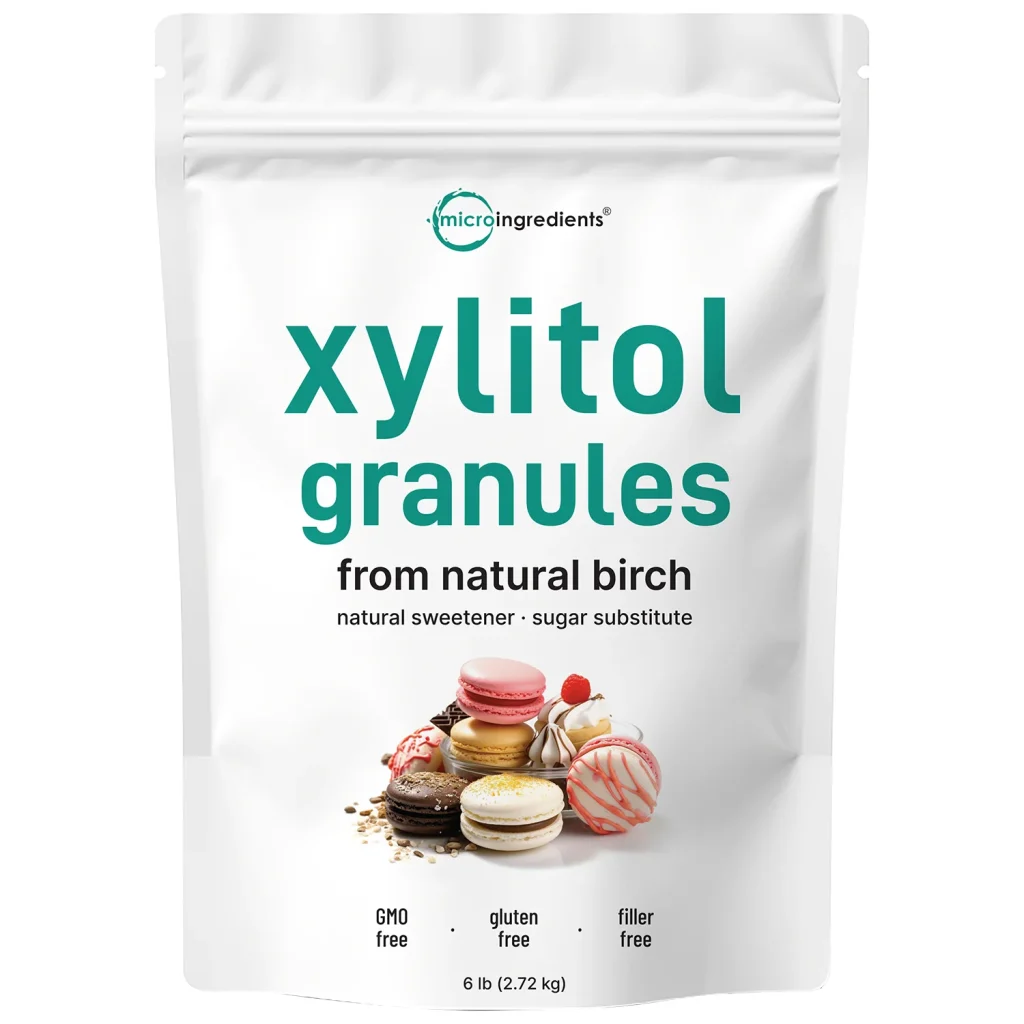
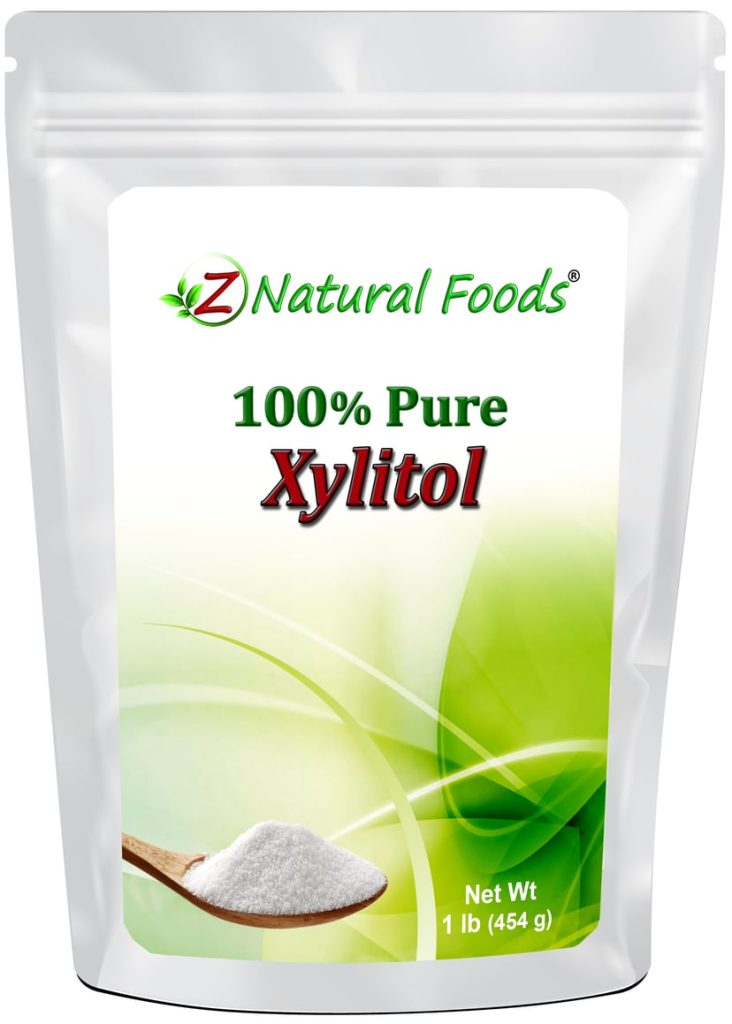
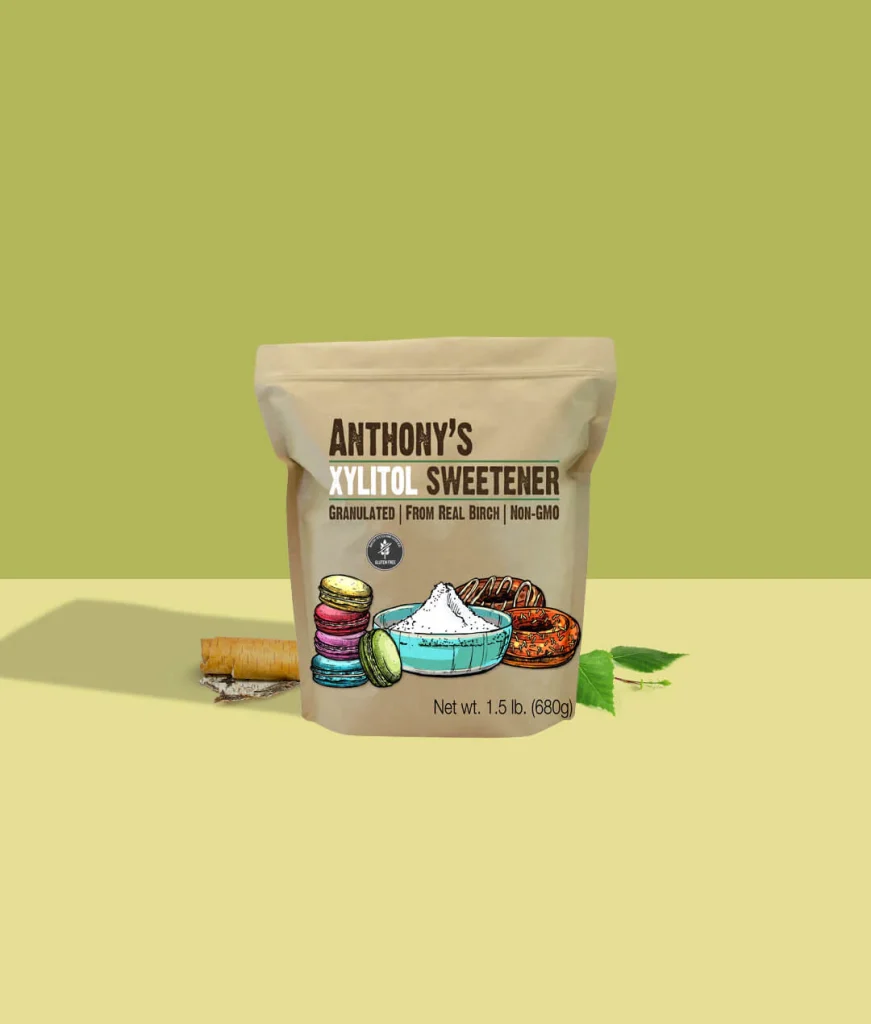
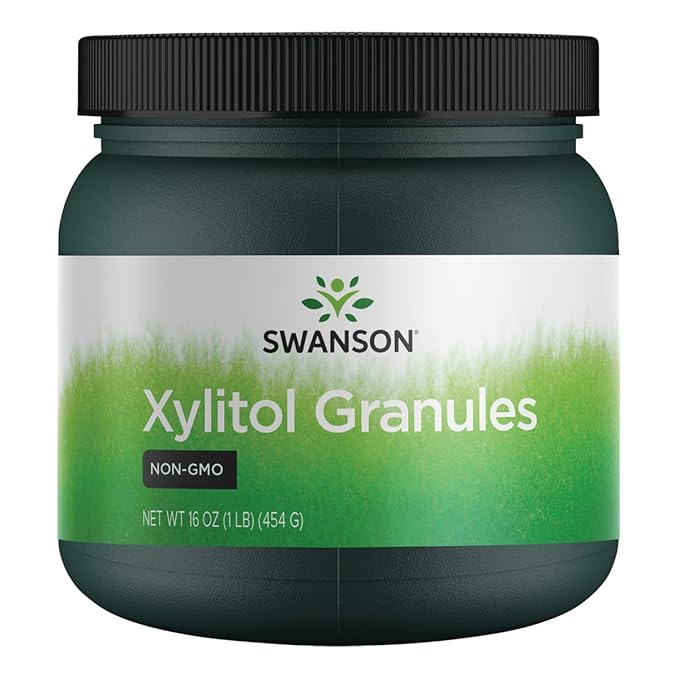
Nutrition Fact of Xylitol Supplement
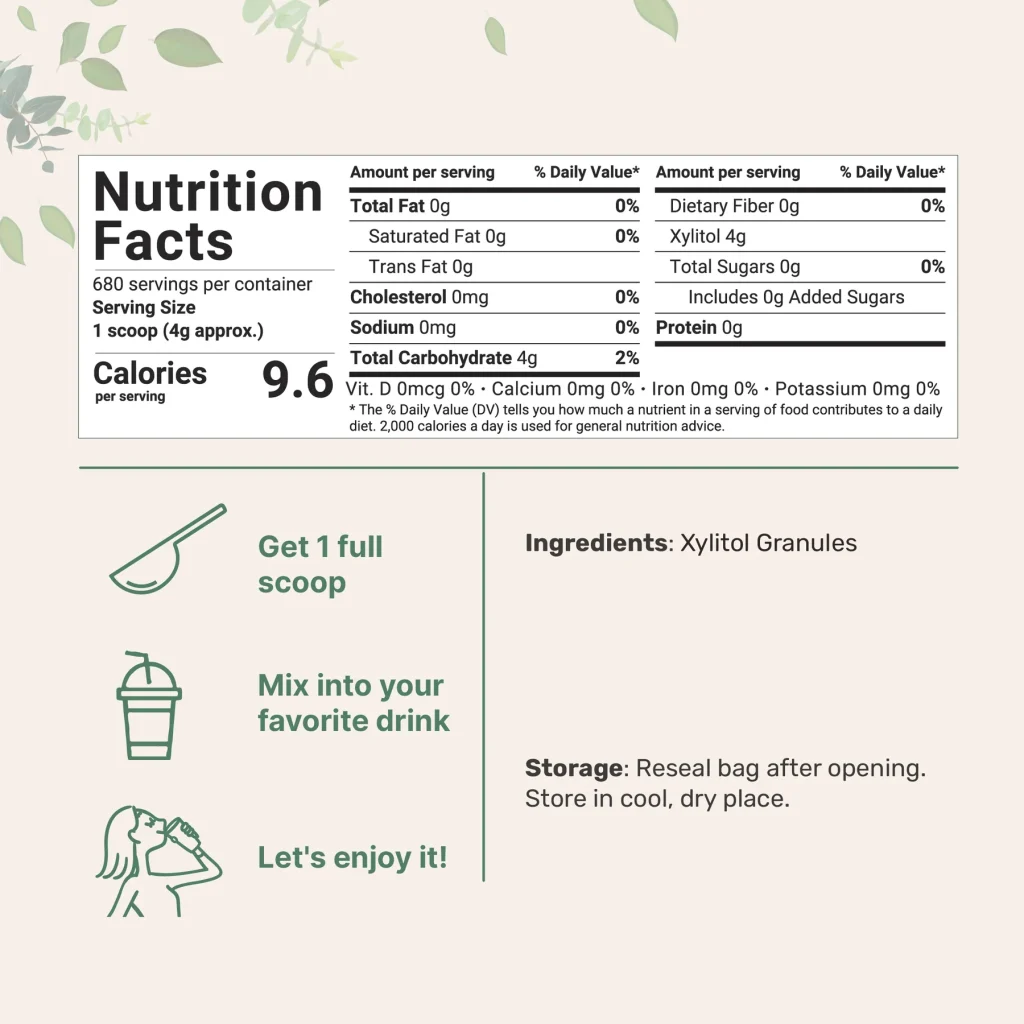
A Quick Review
Xylitol is a sugar alcohol found in plums, raspberries, and strawberries. It’s typically used as a non-glycemic sweetener in sugar-free desserts, gums, candies, mouthwashes, toothpastes, and more. It may have several health benefits, including promoting tooth decay, supporting respiratory health, and acting as a prebiotic for the gut.
As a low-calorie sweetener that does not elevate blood sugars, it can support healthy blood sugar and weight control. However, it may have some gastrointestinal side effects when consumed on its own or in excess. It’s best to consume xylitol in moderation alongside regular meals and snacks, ideally with fiber-rich foods. While generally recognized as safe for human consumption, it is toxic to dogs.
